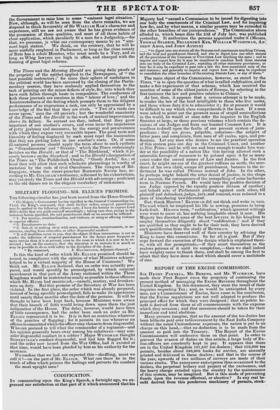CODIFICATION.
IN commenting upon the King's Speech, a fortnight ago, we ex- pressed our satisfaction at that part of it which announced that his Majesty had "caused a Commission to he issued for digesting into one body the enactments of the Criminal Law, and for inquiring how far, and by what means, a similar process may be extended to the other branches of our jurisprudence." The Commission above alluded to, which bears date the 23d of July last, was published yesterday. It authorizes the personsappointed under it (Messrs. THOMAS STARKIE, BELLENDEN KER, WILLIAM WI OHTMAN, AN.; DREW Amos, and JOHN AUSTIN "to digest into one statute all the Statutes and enactments touching Crimes, and the trial and punishment thereof, and also to digest into one other statute all the provisions of the Common or Unwritten Law touching the same ; and to inquire and report how far it may be expedient to combine both these statutes into one body of the Criminal Law, repealing all other statutory provisions; or how far it may be expedient to .pass into a law the first-mentioned only of the said statutes; and generally to inquire and report how far it may be expedient to consolidate the other branches of the existing Statute Law, or any of them."
The main object of the Commission, however, as stated by the Times, " is to open the question of what is called codification, and to
make a fair experiment of that scheme, which has received the sanction of some of the ablest jurists of Europe, by selecting in the first instance the law and practice relative to Crimes."
At last, then, it appears that a serious attempt is to be made, to render the law of the land intelligible to those who live under, and those whose duty it is to administer it; for at present it would be difficult to say which class comprehends it the least. If a man were asked to point out the greatest mass of stupid contradictions in the world, he would at once refer the inquirer to the English Statutes at large, or those precious volumes which contain the de- cisions of our Judges and form our boasted Common Law. It is needless to dwell upon the faults of' our present system of juris- prudence : they are gross, palpable, notorious—the subject of bitter jeers and complaints, from men of all ranks, ages, and pro- fessions. Let any man who desires to see the practical operation of this system pass one day in the Criminal Court, and another in Nisi Prins; and he will see and hear enough to make him won- der at the possibility of a nation like this having allowed such a miserable farrago of nonsense to be palmed upon it for so many years under the sacred names of Law and Justice. In the first court, he might see one of the greatest ruffians on earth, the mur- derer of his own child, escape all punishment, because in the in- dictment he was called Thomas instead of John. In the other, Ile perhaps might behold the utter denial of justice, in the shape of a nousuit, the consequence of the misspelling of some barbarous term in Norman French. He would hear the positive decision of one Judge opposed by the equally positive dictum of another; and behold acts of Parliament jostling against each other, till plaintiff and defendant, judge, jury, and counsel,were reduced to a state of blundering bewilderment.
But, thank Heaven ! BENTHAM did not think and write in vain. The seed which he employed his life in sowing, promises to bring forth fruit. His own term, " codification," which ignorant witlings were wont to sneer at, has nothing laughable about it now. His Majesty has directed some of the best lawyers in his kingdom to employ themselves diligently about "codification ;" and if they are qualified as they ought to be for their task, they have derived such qualification from the study of BENTHAM.
Ministers have deserved well of their country by advising the King to issue this commission. So far all is good. But if they urge forward the execution of the design which is explained there- . s. there- in, with all due promptitude,—if they exert themselves as the zealous patrons of it until its completion,—then we shall indeed have weighty cause to thank them, and shall be among the first to admit that they have done a deed which should cover a multitude of sins.
















 Previous page
Previous page